




Welcome to the Winter edition of your Transforming Lives staff newsletter, as we approach the end of another exciting, engaging and challenging year for our organisation.
Reading through the articles in this packed edition it is clear just how much of an impact we are continuing to have on the lives of those we support across the island of Ireland.
The summer months in particular saw our frontline drug outreach teams in Belfast responding to a rise in the tragic deaths of substance users in the city. In response, we as an organisation issued a repeated call for the creation of a dedicated Overdose Prevention Facility for Northern Ireland, and this is an issue which we will continue to highlight as we enter into the New Year and beyond.
One of our most notable achievements in recent years has been the creation of the Extern Outreach Support Service in Co Limerick, which supports those with intellectual disability or autism. We read with interest how the project is continuing to grow into further areas of work, including the newly-renovated respite property on the outskirts of Limerick city, which will help provide even further supports to our service users and their families.
So many of the conflicts which arise between people and communities can be avoided through taking time to talk and create better understanding. To this end, another project which has had a significant impact recently is the Conversation Piece programme, which has played a key role in breaking down barriers between marginalised young people and the PSNI.
Good governance continues to be a vital component of our work, and Extern is proud to be playing a role in encouraging a new generation of Directors and Trustees through our participation in the Boardroom Apprentice programme. Hearing about the impact this placement has had on our most recent Apprentice – and the enthusiasm displayed by our newest appointee for her year ahead – is an encouraging sign that there is still significant interest in these most vital of roles.
As we have now more fully returned to life as it was preCovid, it has also been wonderful to see so much more faceto-face engagement between our teams and their service users. Not only this, we have now been able to organise more external events, such as the ‘Meet the Team’ day at our newly-refurbished Cavan offices, and the volunteer celebration we held during the summer in Belfast.
As we stand on the cusp of another exciting year for Extern, it just remains for us to thank you all warmly and sincerely for all of your hard work and support over the past year, and wish you and your loved ones a very happy festive season.
Johnny Carroll, Leslieann Scott, Pauline Flynn, Deirdre O’Driscoll, Sharon Hearty
The ongoing cost of living crisis has undoubtedly caused great worry for many of those we support through our frontline work. The impact of rising food and fuel prices allied with soaring interest rates is already being seen among the most vulnerable in our communities.
Ahead of this year’s Budget in the Republic of Ireland, Extern issued a strong call for government to ‘close the gap’ in public funding to ensure that the most vulnerable would not be left in need in the coming year. Currently, 70% of the families that Extern supports in partnership with state agencies are already living in consistent poverty.
Among the key recommendations put forward by Extern were:
- Reinstating funding levels to the Community and Voluntary sector similar to levels which the public sector has been afforded since 2009
- The need for an immediate respite centre and service on the East Coast for families and children in crisis in Greater Dublin
- Expansion of Extern’s Intensive Home Support Service (IHSS), which supports family unity and keeps children out of State residential care. Currently this service costs €256 versus €6,000 per week for a child in residential care.
- A total of €750,000 annually towards the funding of a specialist gambling addiction treatment and prevention service, including dedicated counsellors, in each of the nine HSE Community Healthcare Organisation regions.
While some important relief measures were confirmed during the Budget – including some increases in social welfare payments and eligibility for fuel allowance – there remain many gaps in ensuring that those most in need will not be further plunged into financial hardship.
Leslieann Scott, Extern’s Director of Services (ROI), said: “The Budget could certainly have gone further with more permanent social protection measures. While we welcome the one-off measures and the targeted approach which will benefit those in need, this targeting could have gone further to reach the families and children who critically need it the most.
"As such, we are disappointed for the families and children we support as they will continue to struggle to even stand still financially with poverty firmly at their door. There will need to be further supports for these families as we go through the winter and Extern calls on the government to pledge to release further funding support to the most vulnerable families and children as we go into the winter months.”
She added: “Extern Ireland also welcomes the increase in funding to Tusla and hopes to see additional funding for the increasing number of young people and families in crisis who need intensive supports to stay together in their homes in order to prevent children from entering the state care system.”
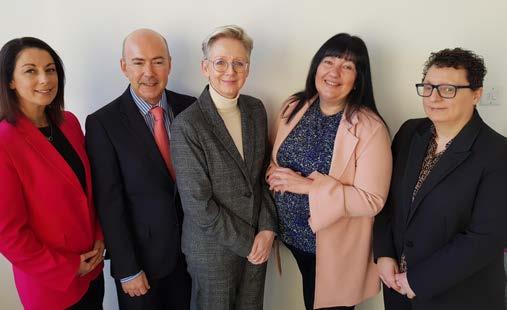
Extern also brought the issue to the attention of delegates at the Sinn Fein Ard Fheis in Dublin, and has engaged a Public Affairs consultant to help accelerate our engagement with policymakers and elected representatives.

We were deeply saddened to learn of the sudden death of our highly respected former colleague Bob Webb.
Bob was one of Extern’s longest-serving team members, working for the organisation for over 36 years between 1983 and 2019. His final role was as project manager of the Criminal Justice Floating Support team, in which he had a profound impact upon the lives of some of the most hard to reach and marginalised members of our communities.
Throughout his career, Bob made a significant contribution to Extern’s work and more generally to criminal justice practice across Northern Ireland. He championed innovative, evidence-based practice in the care and rehabilitation of ex-offenders, which included developing ‘Circles of Support and Accountability’ and a ‘Community Hub’ within the Floating Support Service.
After starting his career within Extern in 1983, Bob became the driving force in the development and establishment of the Criminal Justice Floating Support Service, which continues to operate under Bob’s ethos of relationship-based social work.

Bob instilled the ethos of expertise, a safe and welcoming environment and one built on compassion for vulnerable clients. Those who worked closely with Bob have remembered his unwavering client-centred approach to practice, which embodied the values of acceptance and unconditional positive regard. He was also a committed trade unionist and a passionate advocate for social justice.
Theresa Ormandy, who took over the running of the Floating Support Service upon Bob’s retirement, paid tribute to him, saying: “Bob continued to be an avenue of support for us all, even after his retirement. He was always a great mentor who invested time and effort in people and relationships. You could always ring him for support.
“He was also a tireless advocate of floating support services and continued to champion these after he left Extern. He was always so active and some of us were worried that he might find retirement a challenge after such an accomplished career. Yet he continued to be busier than ever, especially with his academic work which he was able to give more time to. He was also a devoted grandfather and adored spending time with his grandchildren. He was one of the most genuine people you would ever meet, and I know he will be sorely missed.”
Extern Director Leslieann Scott, said: “Bob exemplified the spirit and ethos of Extern, bringing compassion and knowledge to supporting some of our most marginalised service users. He made an incredible difference to the lives of so many, and it is testimony to the esteem in which he was held that so many turned out to pay their last respects to him at his funeral. Our thoughts are with his family and friends at this time.”
Extern’s homeless and hostels services joined together for a pair of special ‘Meet the Team’ events to mark Homelessness Awareness Week in the first week of December.
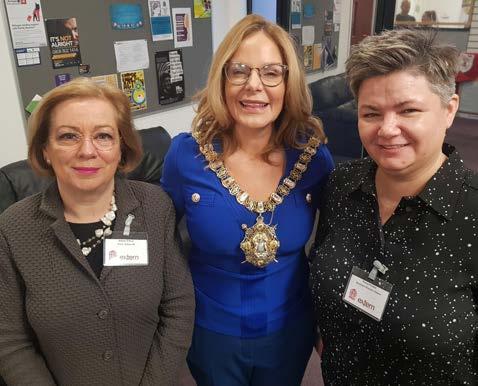
Guests at the events, held in both our Royal Avenue services hub and our Mid Ulster & South Tyrone hostel in Cookstown, included NI Assembly members, local councillors and other political representatives from both areas, who met with staff to find out more about Extern’s work supporting people who are homeless.
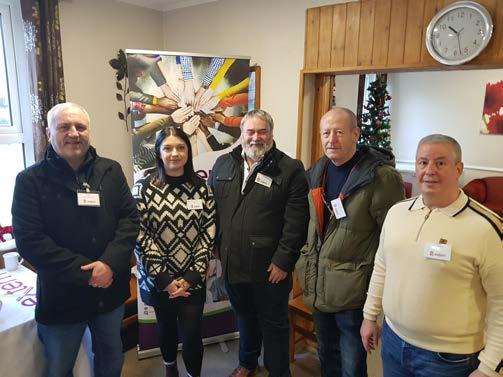
In keeping with this year’s theme of ‘Having the Conversation’, a special panel discussion was also held at the Belfast event to look at the issues which are currently affecting the sector. Chaired by Extern Homes Manager Declan Morris, the panel included representatives from Homeless Connect and the NI Housing Executive as well as staff from our frontline homeless and hostels projects.
Among the key issues covered in the debate were the need for multi-year funding for services, recruitment issues within the sector and how to tackle the lack of adequate social housing for those wishing to move on from temporary accommodation.
Dozens of volunteers and Community Champions from across the organisation were guests of honour at Malone House in Belfast for a special afternoon of food and fun to mark the first year of the Extern Extras campaign.
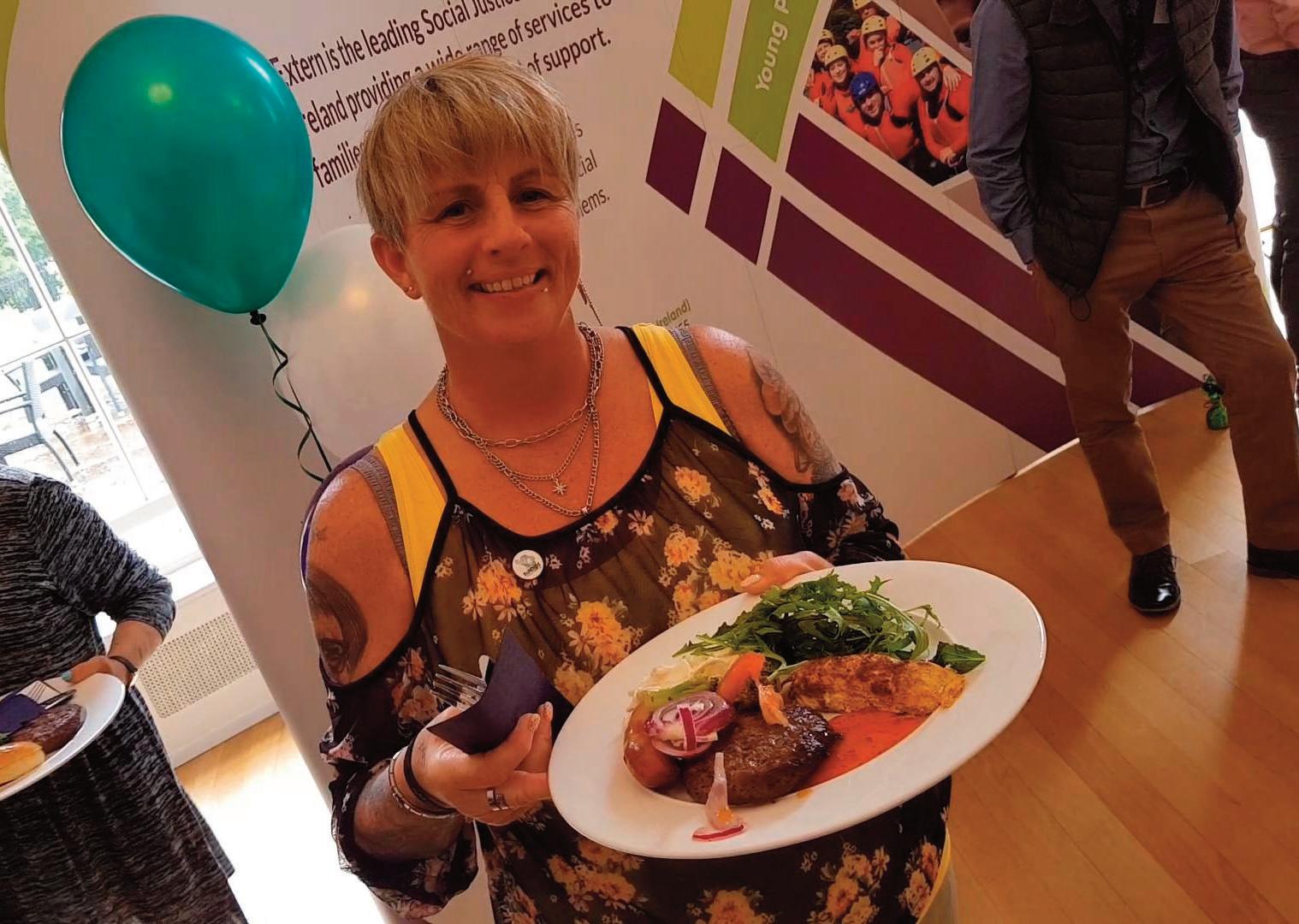
Launched in Spring 2021, the campaign is Extern’s first organisation-wide approach to recruiting volunteers to work alongside projects in a range of service areas. Since going live, the campaign has successfully recruited dozens of new volunteers to projects including Roscor Youth Village, Floating Support, LAC Mentoring Support, the NI Refugee Resettlement Service and Reach Out.


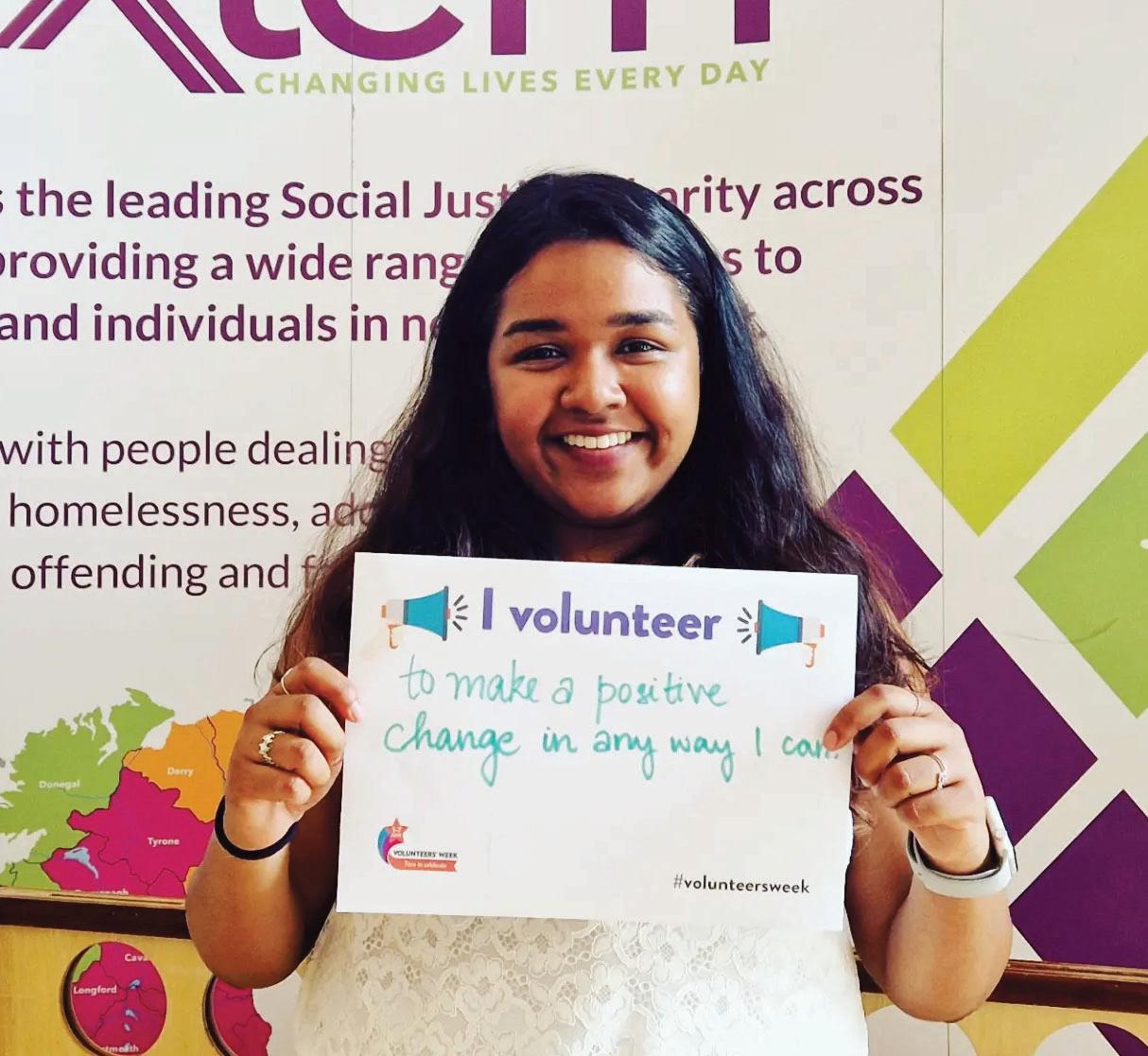


Guests were welcomed to the event by Extern staff including
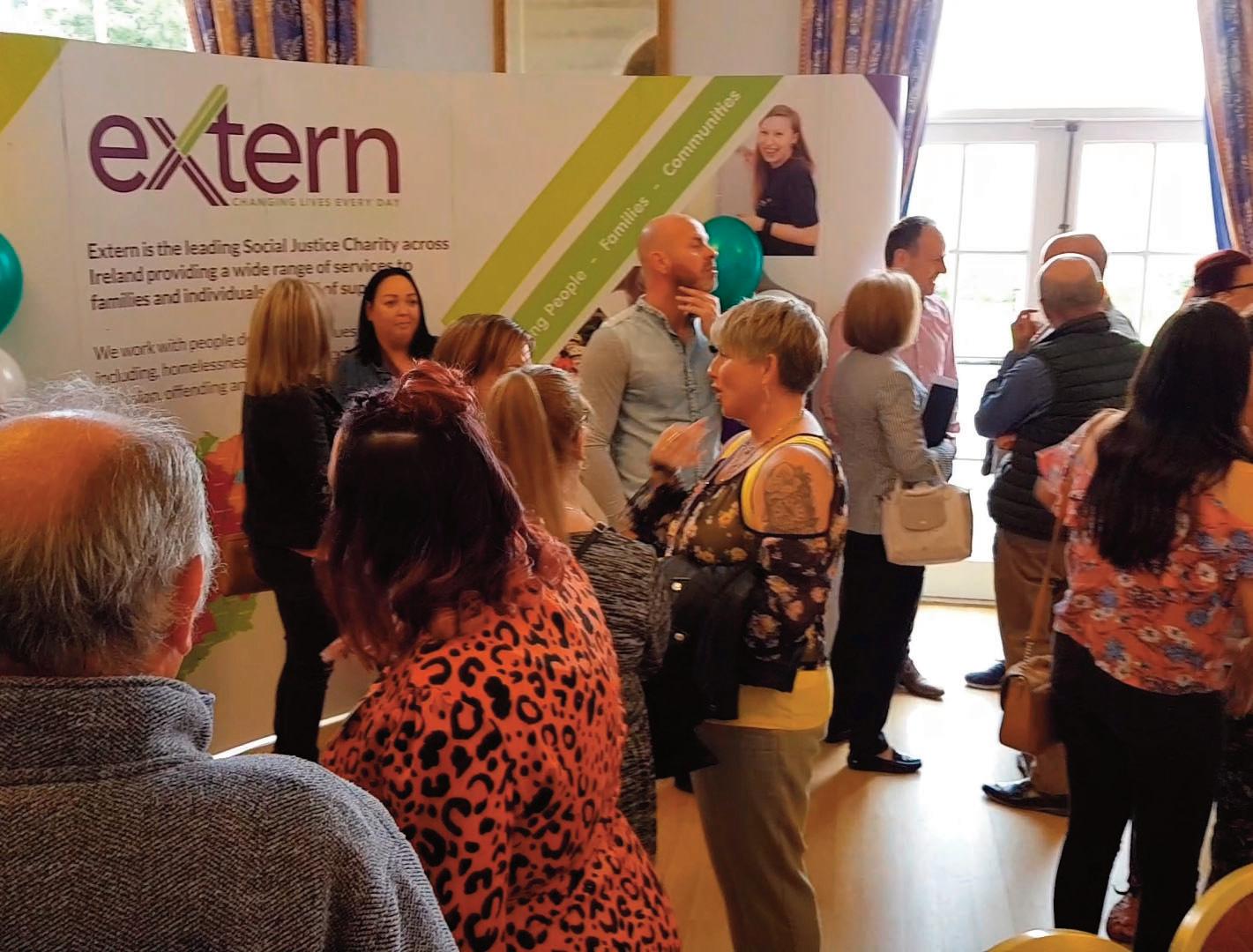
Among the guests were volunteers from our Northern Irelandbased projects, as well as a small number from the Republic, which this Autumn was again the focus of another recruitment drive.
Volunteer Steering Group Chair Declan Morris said the event was an important milestone in the growth of the programme.
“It was a great honour to be able to welcome so many of our valued volunteers to this hugely enjoyable event,” he said. “Working across such a wide-ranging organisation means that many of our volunteers will rarely get a chance to meet, so being able to bring them together in such a relaxed and happy forum was so important.
“Even in this first year alone we are seeing the impact which volunteers can have upon our frontline projects. They are a great asset to our work and we consider ourselves so lucky and

Our Cavan-based teams took centre stage for a special ‘Meet the Team’ event to showcase our newly refurbished offices in the town.
The drop-in event was attended by key stakeholders from statutory and community organisations in the area, who were provided with a tour of the facility and took the opportunity to find out more about our work locally, including our newly-opened Haven respite centre for young people at Oakport Lough in Co Roscommon.
The Cavan building is used as a base for our Traveller Primary Healthcare programme, as well as our Janus and Time Out projects in the area, and recently underwent a clear-out and redecoration. It is now being offered to other groups within the local community for use as a resource for workshops and meetings to be held.
As part of the refurbishment, the Traveller team have developed their ‘hub’ as the focal point for their workshops. From here the team – who are all recruited from the local Traveller community – runs regular meetings and events aimed at promoting practical and important healthcare initiatives.
Extern manager Colin McCusker said the event provided an important opportunity to open up new avenues of partnership working in the area.
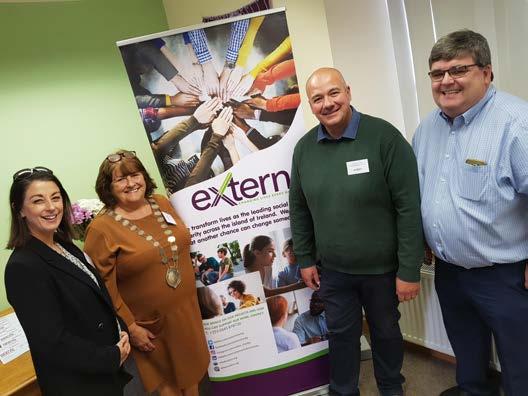
“We were delighted to welcome so many guests to hear more about our work in the area and see at first hand the impact that our projects can have on the lives of so many here,” he said.
“This was also an important moment for our Traveller healthcare team, who did a wonderful job of representing Extern on the day, alongside their colleagues in Janus and Time Out. I know that many of the guests were very impressed with the scope and impact of the work we do, and have expressed great interest in connecting further in future.
“Such engagement events provide an important opportunity to showcase our work and strengthen existing relationships as well as building upon new opportunities for collaborative working.”
The life-changing work of our Youth Diversion Project teams in Co Kildare was the focus of a special visit by James Browne, Minister of State at the Department of Justice.
Mr Browne met staff from Extern’s two YDPs in Co Kildare, along with members of the management committee and local Gardai, during a special visit to the team’s offices in Naas.
The Minister heard about the life-changing work which Extern carries out in support of young people across the area. Extern currently operates YDPs in Naas and Athy, as well as two in North Dublin and Co Limerick. Staff also met with Kildare North TD James Lawless, Chair of the Justice Committee in Dail Eireann.
Co-funded by the Government and the European Union, YDPs provide early intervention and diversionary activities to young people who may be in the early stages of involvement in criminal or anti-social behaviour. The Minister was given an overview of how the YDPs operate and some of the successes and challenges faced by the project. He also heard from members of the community about the positive impact of the project, as well as from senior members of the Gardai on the work being done to divert young people away from crime, whilst also meeting their needs on many other levels.
The Minister also heard how recent successes in sourcing a grant from the Joint Policing Committee will allow Extern to source vital employability measures, in line with the recently published Youth Justice Strategy.

Extern Service Manager Dermot Berry said: “We were delighted to be able to welcome Minister Browne and Mr Lawless for this special visit. Every year we support hundreds of young people and families across Naas and Athy through our life-changing interventions. For our commissioners to be able to meet the team and hear at first-hand about the impact of our work is a great boost to our service.”
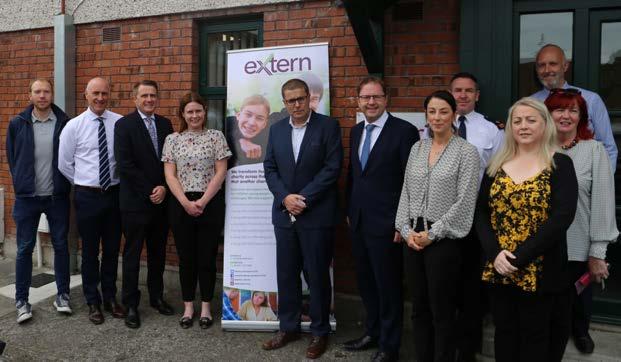
One of Extern’s strengths is arguably its sheer range of projects and programmes, which cover many areas of need – from youth work and criminal justice, to addictions and mental health.
In 2018, we added a new avenue of support through the Extern Outreach Support Service (EOSS). Based in Co Limerick, the project supports people with an intellectual disability and/or autism who may find it challenging to integrate into traditional social, educational or community systems.
The programme supports individuals to identify areas of potential growth that they would like to explore, and to identify steps to achieve goals that are important to them.
Since then, the programme has grown exponentially – from an initial budget of €78,000 at the beginning to over €1.7m today. So too has the project team expanded, and last year saw the exciting news that the purchase of a new respite property (above) had been finalised following a generous €300k donation from the JP McManus Fund.
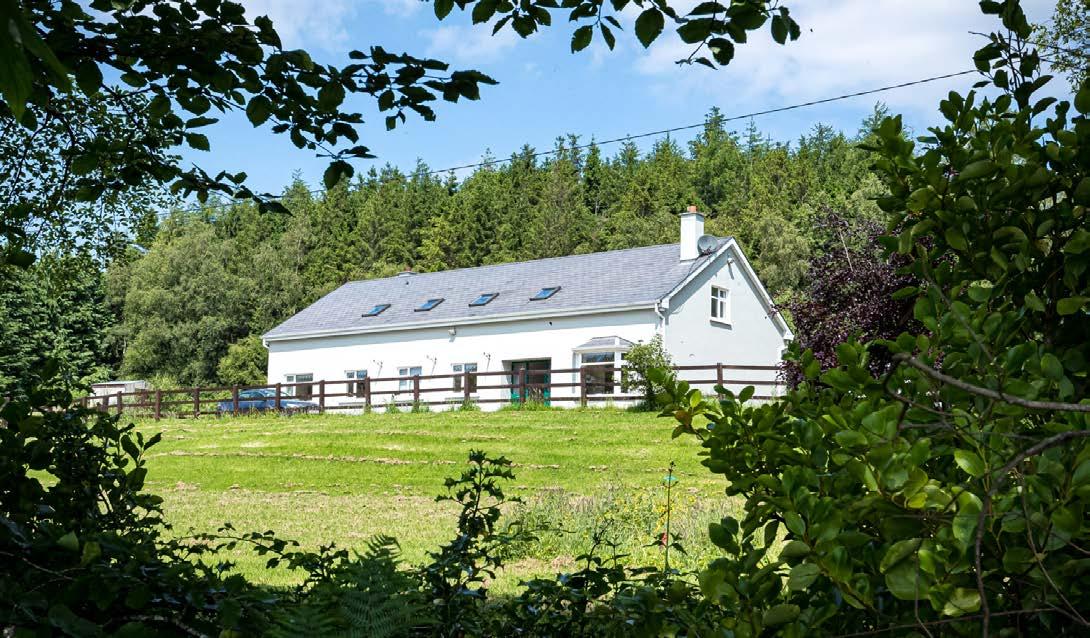
By any standard it has been a period of swift success which even the most optimistic could scarcely have predicted. Present for this since (almost) the very beginning has been Service Manager Bryan Gough, who recalls how the idea for the project first came about.
“Through our Janus project we had worked with a service user who had complex needs, including safeguarding concerns and intellectual disability. So once she turned 18, she was no longer eligible to be part of the Janus project,” he says.
“At that time the HSE would have had responsibility for providing this young woman with a service. They saw the good work that Extern were doing in the Janus project and asked if we could set up
a project and provide workers to meet the needs of this young woman who was turning 18. So we did just that.
“The HSE soon saw the benefits of the project and realised that actually we could meet more service users’ needs than just this young woman’s. So the project then grew naturally from there.”
Moving into such a new and specialised area of care was not without its initial challenges, however, as Bryan and his team adjusted to the particular needs of this service user group.
“One of the immediate tasks was to make sure we had the right policies in place, as some are very particular to the disabilities sector,” he explains. “We also needed to make sure these policies were broken down into legible and readable documents for service users who have intellectual disabilities or autism.
“We also had to be aware of behaviours that might challenge from the service users, as sometimes that can be a challenge in terms of our model, which is an outreach-based model. We have to make sure that service users and staff alike are kept safe in the community. But that is manageable with good risk assessments and a knowledgeable, experienced staff team, which we have in place.”
Communication barriers were also a consideration for the team, given the sometimes complex nature of the service users’ needs.
“That could be to do with someone's cognitive ability or also their physical disabilities in terms of hearing,” says Bryan. “A number of our service users are also nonverbal, so alternative communication strategies needed to be the priority there. The consequences of not communicating successfully with a service user who has these barriers might sometimes lead to frustrations and even behaviours that challenge, which we want to avoid at all costs.”
Moving into new areas of work can bring many challenges, but many rewards too, as Matthew McCreary discovers of one our hugely successful projects in Limerick
Given the challenging nature of such work, it is not an area for which everyone is suited, and Extern ensured that those joining the project team were able to meet all of the needs of our service users.
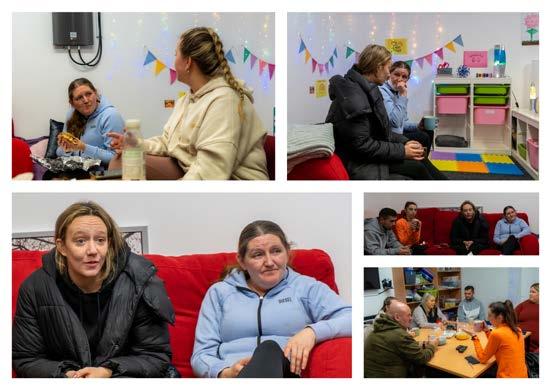
“When I look at the staff team here there's such a varied skillset,” says Bryan. “They all have their own style and ability and skills, and no one is like the other.”
Another consideration when working with those with autism or intellectual disability is helping them to overcome the everyday prejudices and misconceptions they may face.
“That has definitely been the biggest learning for me, as I have no background in working with people with disabilities,” says Bryan. “When I first started working here, I was nervous around how to communicate with a service user who was maybe nonverbal or had communication difficulties.
“It was through the interactions with service users over the weeks and months when I initially started here which allowed me to break down those barriers for myself in terms of how to engage. And that's true for the majority of the public who don't have contact with someone with a disability or a communication challenge.
“So bringing the service users out into their own community activities where they do get the chance to meet other members of public is very important. That allows them to break down those barriers and the misconceptions that people have.
“It’s also a huge learning for members of the public that these are not ‘others’, that they are people who have personalities and feelings and can engage successfully in conversation. And for me that's hugely important.”
Such has been the nature of the growth that the project has now effectively divided into two, more manageable, sub-programmes – the Extern Outreach Support Service and the Extern Disability Respite Service.
The acquisition of the new property in Meelick, Co Clare, on the outskirts of Limerick city, is also a major development for the project. While work is almost complete on preparing the property it is hoped that it will soon be ready to welcome its first guests.
“This will allow for service users to have much more space and feel more comfortable in their surroundings,” says Bryan. “They can personalise their own rooms for when they stay. And it's in a scenic and beautiful location where we would hope that they would feel at peace and relaxed.
“That, of course, is the aim of the place, but it’s also about giving them enough space to allow them to work on their goals that they themselves have for their futures.”
Our Dublin-based Intensive Home Support Service (IHSS) and Janus programmes have been giving parents an opportunity to come together and share their voice as part of successful six-week programme.

The Minding Me Parenting programme was set up to give participants from both projects an opportunity to meet other parents and share similar stories and interests.
Based at our Ballyboggan offices in Dublin, the programme has been providing practical tips and information on subjects that help and support them in their daily lives and improve their parenting skills. These include areas such as self-care and home safety as well managing court appearances and social work case conferences.
“The idea came about as many parents have a fear of attending courses for parents where they don’t know anyone” says IHSS Manager Dara Hearty. “We felt that by creating a space for them where project workers facilitate and support them in small group sessions that it would help ease their fears and anxieties around this.”
The programme has had an excellent response, with some parents who were fearful at the beginning looking forward to attending on a weekly basis. It is hoped that another programme can be run in 2023.
“One of the primary aims of IHSS is to build parents’ support networks in the community in an effort to identify people they can call on both in their daily lives and in the case of an emergency,” says Dara. “This programme has helped parents start to build relations with other adults and see how the sharing of support and information can improve both their lives and that of their children. It’s helped them build trust and resilience and shown them that they can have confidence in themselves and feel safe to join other groups without feeling judged or fearful.
“The programme has also motivated the parents to care for themselves and take time for themselves prioritising their own needs as well as that of their children.”
Plans are also now underway for a specific follow-up programme for dads, centred around sports, with the aim of developing relationships between fathers and their children.
Recent years have seen the issue of drug use in Northern Ireland move steadily up the statistics charts to the point where we are now recording more than double the numbers of drug-related deaths than a decade ago.
With the issue now entering increasingly into the public and political consciousness the common agreement is that ‘something must be done’ to combat the continuing tragic loss of life on our streets. The situation reached a tragic peak this summer with the deaths of 16 people on the streets of Belfast due to overdose, all within weeks of one another.
In response, Extern called for the creation of a dedicated Overdose Prevention Facility for Northern Ireland, in an effort to slow the rate of deaths and offer vital supports to those tackling problem substance use. This is not the first time Extern has made this call, having publicised the need for an OPF for a number of years. Views are understandably mixed on this issue, with proponents citing the already proven impact they have had in preventing drug-related deaths in other countries worldwide, and opponents claiming that they encourage drug use and prolong addiction.
Extern is now on a journey of engaging with key stakeholders and policymakers in an effort to advance the discussion and highlight the critical need which has now presented, as well as trying to inform and shape public opinion on the issue.

While many people may be supportive in principle of an OPF, questions such as how this could be funded and where it would be located present potential sticking points. And while the costs of setting up such facilities can be significant to begin with, there is a bigger picture in terms of the impact they can have in reducing longer-term costs – not to mention the human cost of every life lost.
“We're measuring this against somebody's life - this is somebody's son, somebody's daughter,” says Extern drug outreach manager Iain Cameron. “But when you factor in the cost of managing overdoses on the streets, the cost of ambulance crews, medical services, police time, OPFs have proven that they are good ‘value for money’.”
With considerable expertise already at work on the frontlines in Belfast, and many otherwise vacant or partially used properties within the city, the timescales for setting up a first OPF there could also be relatively swift.
“We already have within Belfast very well-trained staff and services that respond to this problem on a daily basis,” explains Iain. “For example, in Extern we have our Street Injectors Support Service who are out in the streets on a daily basis carrying the opiate overdose reversal drug Naloxone and responding to overdoses. We have a number of other sites throughout the city which work with people who are street homeless and drug dependent, and staff are very skilled at administering Naloxone. So I think we could rise to the challenge quite quickly.”
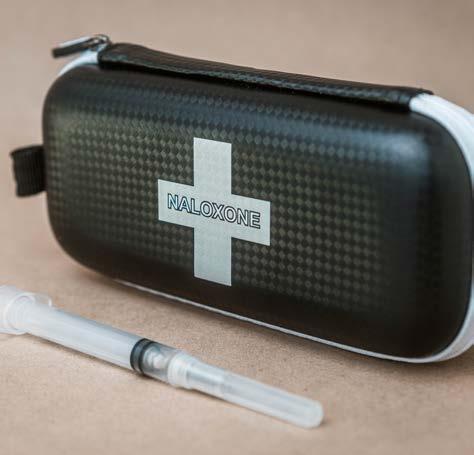
With drug-related deaths in Northern Ireland doubling over the past decade, the call for the creation of an Overdose Prevention Facility is now becoming stronger than ever. By Matthew McCreary
The legalities of opening such a facility also present a challenge. At present, any OPF which was opened in Northern Ireland would be contrary to current legislation, namely Section 8 of the Misuse of Drugs Act 1971 and Northern Ireland’s Criminal Law Act 1967 which requires an individual to report an offence if they know that an offence has been committed. Indeed this was recently cited by Northern Ireland’s former Health Minister Robin Swann as a key reason as to why OPFs cannot become a reality as the law currently stands.
OPFs are now operating in fourteen countries, including Germany, Portugal, Australia and the USA, with many reporting successful reductions in deaths and drug-related harm. Vancouver in British Columbia, Canada, is often cited as an example of OPFs successfully having a positive impact within a city. At the time the city’s groundbreaking Insite supervised injecting facility opened in 2003, Vancouver was experiencing the kind of alarming, headline-grabbing drugrelated issues which Belfast experienced this summer, with calls for radical action to be taken. A legal exemption was granted which then allowed the centre to operate on the condition that its impacts be rigorously evaluated.

“There had been an increase in drug-related deaths, an increase in toxic drug supply, and an increase in the spread of bloodborne viruses like HIV and Hepatitis C,” says Lynn Jefferys, who spent over a decade working with people who are homeless in the city.
“These were all things that the community knew was going on, but I think there was kind of government inaction because they said that maybe the research wasn't there, the data wasn't there. So Insite was opened as an evaluation premises. They said, ‘Okay, we'll sanction this, evaluate the first 1,000 people that come in and then we'll see’. And since then it's just stayed open because the community knew the need was there.”
As Lynn points out, though, the Vancouver-based sites still face some scepticism even two decades on – and in spite of so many thousands of lives having potentially been saved.
“That's never gone away,” says Lynn, who now works in Dublin for the European Network of People Who Use Drugs, which helps to inform policy around harm reduction. “Public opinion is still not 100% on the side of harm reduction. That's still a fight that people have to do. It's just the numbers of deaths were increasing so they had to do something.”
With the Stormont Assembly still in limbo, and no immediate prospect of a change in the UK-wide laws which could allow for OPFs to be established, more imaginative approaches may have to be considered to try and establish a facility in some shape or form.
“For Belfast, I think you go the research route and you apply for exemptions to evaluate a pilot project,” suggests Lynn. “That's the practical way forward in terms of changing public opinion. The only thing that's going to do that is if the government and the media starts supporting it or they start seeing the positives. And the only way to do that is to put it into action.
“People fear what they don't know, and they'll fill in the gaps however they see fit. So it's about providing concrete scientific evidence.”
For Iain Cameron too, any moves towards taking us closer to the opening of an OPF in Belfast are to be welcomed.
“We do some things really well here. I'm extremely proud of our needle exchange services, extremely proud of our take on the Naloxone programme, and in some ways we are on a par or maybe further ahead than some places in UK, Ireland or Europe,” he says. “However, in this issue we're massively behind and we need to gain ground quickly because people are dying and that's what this is about. Every single one of those deaths is preventable.”
What are Overdose Prevention Facilities?
Overdose Prevention Facilities (OPF) are specially designated spaces where people are able to take drugs safely, using sterile equipment, under the supervision of trained staff, who can respond immediately to overdose.
What are their aims?
• Reduce overdose deaths
• Reduce the transmission of blood-borne diseases such as HIV and hepatitis
• Reduce and treat infections and infection-related wounds
• Offer opportunities for drug users to engage with healthcare staff, social workers, and other supports
• Reduce drug-related litter and the visibility of drug using within communities
Overdose Prevention Facilities can be located within both medical and community spaces and operated by a range of professionals including social care staff, those with medical training and peer supporters. To date, various models exist around the world but Extern's aim is to promote a facility that ensures the health and well-being of its service users.
Can OPFs really have an impact on drug deaths?
Evidence provided by studies suggests that, where coverage is adequate, drug consumption rooms may contribute to reducing drug-related deaths at city level. A study in Sydney, Australia, showed that there were fewer emergency service call-outs related to overdoses at the times the safe injecting site was open, while the Insite Centre in Vancouver, Canada (above) has helped reverse over 6,400 overdoses since 2003. Crucially, nobody has ever died of overdose in an OPF worldwide since they were first opened over three decades ago.
Mention the words ‘boardroom’ and ‘apprentice’ together in close proximity and it will doubtless conjure up images of an irate Alan Sugar or Donald Trump tearing into hapless young executives for the iconic television show.
While that rather contrived version of corporate life might provide plenty of entertainment value, it couldn’t be farther from the reality of the serious business of Boardroom activity which underpins the work of organisations like Extern.

Extern’s three Boards of Trustees – for Extern NI, Extern Ireland and Extern Group – play a vital role in overseeing corporate governance and ensuring that the right checks and balances are adhered to in the running of the organisation. Such are the responsibilities of these roles that those who become Trustees often have decades of experience in their fields of work, with many having previously held similar positions with other organisations.
So how does one break into such a high-level and often demanding role? One avenue is the Boardroom Apprentice scheme, which Extern has been a supporter of for a number of years now.
Created in 2017, this is a 12-month board learning, development and placement programme which enables those who would like to serve on a public or third sector board to learn and gain experience through indepth training and support.
Open to those aged 16 or over from all backgrounds and all abilities, the programme seeks to enable a wider diversity of individuals to play their part within boardrooms and helps move the board member role from aspiration to reality.
To date, the programme has helped over 200 candidates across Northern Ireland to begin their Boardroom journey thanks to its support from the Department of Finance.
Extern’s most recent appointee is Caroline Maxwell (see interview right) who took up the post from outgoing Boardroom Apprentice Dr Ashley Morrow. Ashley (left) works as a brand and advertising manager in the energy industry and found the experience provided a very positive insight to the work of Extern and the wider social care sector.
“I first heard about Boardroom Apprentice from a colleague who had completed the programme a few years previously,” she says. “She highly recommended the experience and felt it was a well put together, quality programme that would get someone interested in joining a board off to a great start. She was right!”
Such is the wide range and geographic spread of Extern’s projects that it can often be known for different things among different people. For Ashley it was a case of learning as much as she could from the outset.
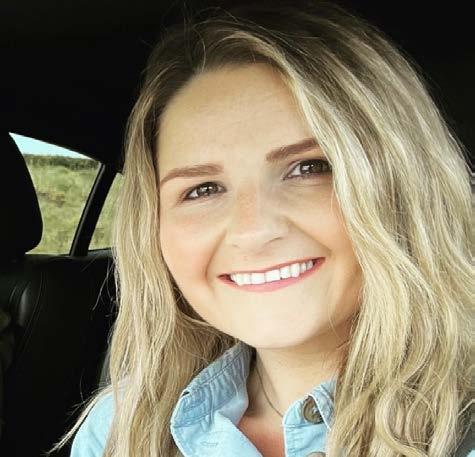
“I didn't know too much about Extern except for some fundraising and awareness activities I'd seen advertised in my hometown,” she says. “However when I started to look through the list of options for my board choices, Extern really jumped out to me. I loved that it helps so many people across so many diverse services. Especially the services that normally go under the radar but are so vital to fully integrate people into our communities and influence positive change.”
fter successfully applying for the post, Ashley set about getting to know the organisation, and her fellow Trustees.

“My first impressions were good. The Board chairperson, Aideen D’Arcy, was warm and welcoming and immediately made me feel at ease,” says Ashley. “As Covid was still very prominent at that time, all of my board and sub-committee meetings were online. I’d say that hindered me in getting to know the other board members better as we didn’t have the opportunity for more informal conversations before or after meetings. Nonetheless, everyone was very welcoming and treated me as a valued member of the team from the outset, which I really appreciated.”
As demanding as the role can sometimes be, time for learning is built into the process to ensure that apprentices are able to keep up to speed with the requirements of the position. During the year, each Apprentice has to attend a number of learning days on topics such as finance and governance.
“I read all of the board papers in advance and tried to apply what I was learning during the monthly learning days, which really helped me to understand the conversations and decisions during the sessions,” explains Ashley. “Boardroom Apprentice is a learning experience so I made sure to make the most of that, but I did try to add value by sharing my opinion and professional experience where I could.”
As many of those who volunteer for the Boardroom Apprentice role also work full-time as well, it can be a considerable commitment in terms of time, and an understanding boss is a benefit.
“The time commitment shouldn’t be underestimated, especially to get the most out of the experience,” says Ashley. “However, I’d say it is definitely an experience that is for all. As long as you can make time for the set board meetings and learning days, you can fit in the rest around your day. I was very fortunate that my employer was very supportive of me taking time out of my work day to join the sessions.”
While a key motivation for applicants is often the desire to make a difference and give back to society, there are also so many benefits to one’s own development both personally and professionally from taking up a Boardroom Apprentice post.
“The training, experience and support I’ve received has been so valuable,” says Ashley. “Having the opportunity to join the Extern board gave me such a unique opportunity to see first-hand how a board operates. I feel privileged to have played even a small part in influencing the great work that Extern does. The whole programme has given me the extra skills and experience to put myself forward for board membership in the future.”
For further details on the Boardroom Apprentice programme, visit www.boardroomapprentice.com
Caroline Maxwell is Extern’s Boardroom Apprentice for 2022-23. She took time out to chat about her experience of the role so far and what she hopes to achieve during her tenure.
Welcome to Extern, Caroline. Tell us a little about yourself.
I come from Portstewart originally but live in Bangor now. I work as a management consultant for the public sector, providing advice on the value for money of projects using taxpayer funds. As a chartered accountant I enjoy working with facts and numbers, but as a Psychology graduate, I also love to talk to people and understand what makes them tick.
Why did you apply to be a Boardroom Apprentice?
I have been interested in the programme for a few years, but this was the first year I really considered applying. I know someone who participated last year, and she urged me to go for it, saying it had been a really positive experience for her. After lockdown there were really no excuses for not getting out there and working towards my ambitions.
Why did you choose Extern?
I was keen to choose a charitable host board as I work with public sector organisations in my day job and wanted to get a closer look at how essential services are delivered for hard-to-reach groups in our society. When I researched Extern, I was impressed by the breadth of services offered, as well as its ethos of reaching in to provide the services most needed by people.
What have been your first impressions of the role?
My impressions of Extern so far are positive. If anything, the services delivered are even more diverse than I realised when I applied, and the organisation seems to be operated professionally and with a great deal of passion and care. In terms of the trustee role, there is a lot of detail and paperwork to get up to speed with and it is tricky following all of the changes which Extern has gone through in recent years.
What are your hopes and expectations for the role going forward?
This is a unique opportunity and I want to get to know Extern as well as possible and offer as much as I can in terms of my skills and experience. I would love to go on service visits to see in person the great work being done by the teams and to hopefully make some valuable contributions at board and committee meetings. It will be interesting to see how any emerging issues are dealt with by the board as the year continues.
Have you ever undertaken a role like this before?
I have been involved with charities before through volunteering roles and sitting on a fundraising committee but never felt that I was the ‘right type’ of person to step into a boardroom. Boardroom Apprentice is showing me that anyone who wants to serve has something to offer.
What do you hope to get out of this experience?
I am hoping to gain confidence, governance and interpersonal skills and new networks and contacts. Most importantly though, the last few years have been (and continue to be) really tough for people. While I want to gain skills and knowledge from participating in the Boardroom Apprentice, I hope that through the experience I can make even a small contribution to improving the lives of people in need by supporting Extern to do its important work as effectively as possible.
fl
rst place. Matthew McCreary finds out how the Conversation Piece project in Belfast has helped young people and police to find common ground.
Perhaps one of the saddest legacies of the Troubles in Northern Ireland has been the continuation of the social conflict through younger generations.
Many of those who become involved in street level violence and sectarianism were born after the Good Friday Agreement, and yet have never benefited from the optimism it generated for a shared future. Too often this can manifest in anti-social behaviour and petty crime, underpinned by an antipathy towards authorities.
This is an area of work which has already been tackled by Extern before, most recently through the Personal Change Programme, which sought to divert young people away from such negative pathways.
There is still much work to be done, however, and the Conversation Piece project is one such example of how Extern has been trying – and succeeding – in changing mindsets.

Created in 2019, Conversation Piece was commissioned by Belfast City Council’s Policing and Community Safety Partnership to ‘personalise’ relationships between young people and the Police Service of Northern Ireland. One of the purposes of the project was to encourage young people to see police officers as ‘real’ people – that by humanising the men and women in uniform they might engender better relationships.
“I think we can see across Northern Ireland where the relationship between young people and the PSNI isn't good,” says Caroline Rutherford, Programme Manager for Young People and Families. “That’s often down to their own lived experience of their own interactions with the PSNI. Young people weren't reporting crimes, and they weren't going to the police for assistance.”
The reasons for such reluctance are many, but one key underlying issue is the influence of paramilitary organisations, who continue to hold sway over many areas within Northern Ireland.
“For a lot of the young people that we work with, that's still their reality, that the paramilitaries are the lawful authority in the areas where they live,” explains Caroline. “They don't have a lot of confidence in the police for solving crimes. And that's one of the things that came through with the conversations we have been having, that they didn't realise the processes that the police have to go through when dealing with reports of crimes.
“They think if they report somebody for selling drugs then the police are going to come out and arrest them right away, and that's not necessarily what's going to happen. There'll be an investigation, the police have to gather evidence, people can get out on bail, and a prosecution can take up to a couple of years. So for a lot of young people, if they want swift justice the paramilitaries are going to give it to them quicker than the police are.”
Giving young people the confidence that they will be listened toand heard - has therefore been a crucial aspect of Conversation Piece. While the premise of the project is, at first glance, straightforward enough – people sitting in a room and talking – it requires a great degree of preparation and management to ensure the sessions get off on the right foot.
“It seems simple but it's not,” emphasises Caroline. “You need a really skilled facilitator to be able to direct that conversation and get a positive outcome. If we got it wrong, then the danger was always going to be that you'll create more damage, that you'll reinforce the stereotypes and reinforce that negativity.
Words matter when it comes to resolving con
ict - or preventing it in the fi
“So our staff would do a preparation session with the young people beforehand, explaining what's going to happen and asking them what kind of questions they want to ask the police. We'd then pass that on to the PSNI before they come in so that they're briefed as to what the conversation is going to be about.
“And in terms of the PSNI officers that we brought in, we asked for the local neighbourhood police or for specific police officers who we thought would be open to this.
“So the concept of it seems simple but there's a lot of preparation and skills facilitation to make it constructive.”
Extern’s wealth of experience in supporting young people through its youth work projects also provided a positive basis for the project to build upon. Indeed, Covid restrictions around the time of the initial launch meant some of the earliest sessions were rolled out with young people who were already engaged with Extern’s projects, such as Pathways and PCP.
“The initial response from the young people was good,” says Caroline. “They'd never had an opportunity to sit down with a police officer before so they were interested in being heard and asking questions.”
As for so many things, word of mouth among the young people themselves also generated further interest among their peers.
“We did have a lot of resistance from one group in particular in the West Belfast area who we had approached first of all,” recalls Caroline. “They said definitely not. Then another group of young people from the same area came back talking about how great it had been, so that first group approached us again and said they would give it a go after all.
“They wanted to have it in a neutral space so we brought them to our office here in the city centre. But they really took control of it themselves and owned it, right down to putting the chairs where they wanted the police to sit. For their part, the PSNI were very keen to get into what they would see as hard to reach areas, so this was an opportunity for them to engage with this group that they never had before.”
Feedback from both the young people and PSNI was positive, creating a solid grounding for the work to continue.
“For many of the young people it has completely changed their attitudes or their opinions,” says Caroline. “They’re going back out into the community and telling their friends what they've been doing. We’ve had other community groups and other groups approaching us since.
“Some of the feedback from the PSNI was that young people were even looking at the police as a possible career route as well, which is another benefit that we weren't expecting at the start.”
While the project proved to be impactful, it was nevertheless only a pilot, and being able to continue it on a longer-term basis would require a firm commitment from all parties involved.
“Initially we were asked if we could continue it with the funders ‘buying us in’ to provide the service, but it's not financially viable for us to do that,” says Caroline. “But since then we have been having encouraging conversations among the various parties to see how we can roll it forward more long-term.”
Gaining the trust of the young people has been one of the biggest obstacles Extern has overcome so far and will provide a vital foundation in diverting young people away from more malign influences.

“Initially we were brought into this whole thing as a kind of ‘honest broker’, but I think Extern's role could be wider than that because we have the trust and are seen as neutral, and young people know that,” says Caroline.
“Paramilitaries do still have such a strong influence on so many of our young people so what I would like to see is that control being taken away and for young people to be freed from that.
“So if this can provide a small step towards that, then it's a step worth taking.”
Hi Matthew! Tell us how you came to join Extern
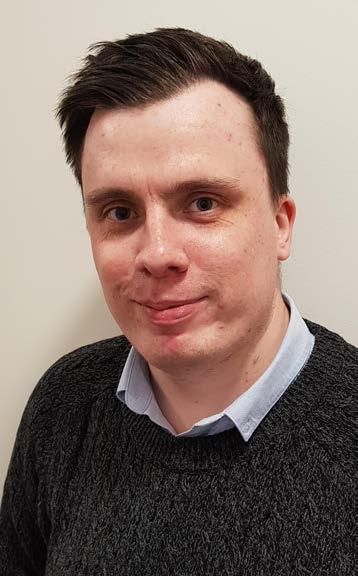
I previously worked for a charity called Inspire, which is a similar health and social care organisation to Extern, in the Organisational Development team. I worked in learning and development, employee engagement and wellbeing. I enjoy helping to create a positive employee experience, so this role within Extern appealed to me. I was looking for a new challenge and to develop in my career, so I went for it.
What made you want to work for Extern?
I enjoy working within the charitable sector as you feel as though you are part of a bigger picture and are helping to deliver crucial services in the community. I think that the culture of charity organisations tends to be more values-based, as the focus is peoplecentred rather than having a focus on business and profits that you have in many commercial organisations.
What sort of work do you and your team do on a day-to-day basis? I work within the HR Team where my role is to develop and facilitate training solutions. This entails developing, delivering, and tracking training that is for the whole organisation based on internal policies and procedures. I am currently working on making changes to the Management Academy to offer something that is different, as well as working on online training solutions for the organisation to help monitor compliance and make it more accessible for everyone.
I also work within the area of employee wellbeing, and I coordinate Team Energise to come up with ideas and initiatives that we can roll out across Extern. I launched the new Wellness Hub on Xnet and hope that this is something that employees will find useful in the long term.
I also keep an eye on the calendar to see what wellbeing days are coming up, such as World Mental Health Day, World Menopause Day, and work on developing resources and initiatives around this.
What are the qualities you need to do your job?
Creativity and problem-solving skills are important within my role as I have to come up with engaging approaches to learning and development and wellbeing. I enjoy thinking outside the box and coming up with solutions that make good use of modern technology and software. A people-centred approach, in which you listen and communicate well, is also important and shows empathy and understanding to others. Good communication skills are also needed in delivering training and in encouraging involvement from staff.
What do you enjoy most about your job?
I enjoy doing work that helps to promote a positive employee experience, whether this is learning and development or an employee wellbeing initiative. In my role there is scope to be creative in terms of approaching things differently to how they’ve been done before and to put my mark on things, and I like having that challenge.
Have you had any interesting stories you can share with us?
When I started with Extern, I was studying for my Associate Level CIPD (qualification in HR) with a training organisation called DMS and was approaching the end. I found out when I started that two of my colleagues, Caoimhe and Sharon, who had been in different cohorts were also finalising their studies and were going to be at the graduation event (below) on the same night. It was great to have been at the event together to mark the end of studying on evenings and weekends!
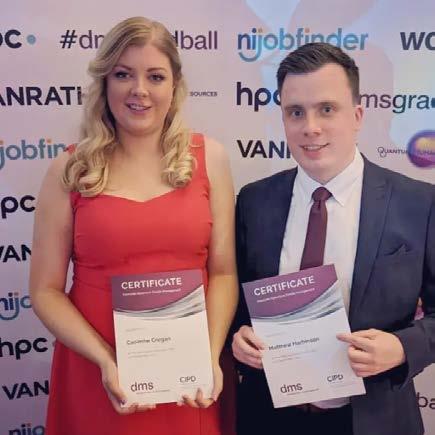
And what do you like to do when you’re not at work?
I like to spend time with friends and family and am involved with my church and in volunteering my time. I like to read novels and watch TV series too. I am also interested in politics and international affairs and follow the news closely. I enjoy a city break and am a big fan of London and Madrid. I am also a big coffee and pasta fan and enjoy finding the good spots, or making nice ones at home!
We love hearing about how Extern can change lives, not only for our service users but for our staff and volunteers as well. This month we meet Matthew Harbinson, who joined Extern earlier this year as our Learning, Development and Wellbeing Advisor.
Becoming a Policy Rep not only helps shape our journey forward into a strong new future, it can add value to your working relationships too, says
As an organisation, Extern has been through a period of profound change over the last few years. And nowhere has this been more evident than in the strides we have made in developing our policies and procedures.

Having a robust framework for how we manage and handle our dayto-day workings – from the often-unpredictable demands of frontline practice to the everyday requirements of office life - is fundamental in enabling us to meet our responsibilities as a leader in our field.
With so many of us working across separate locations, being able to put our minds together is crucial to helping us become a better, stronger and more progressive organisation.
One way in which you as our valued co-workers can have a truly meaningful impact on our work is by taking an active role in helping to shape and develop policy and practice in our workplace. As we have widened and developed our range of policies in recent years it has become apparent that hearing the voice of our teams is crucial to making sure we are able to create policies which truly reflect our work.
With this in mind the Policy Rep role has been created to ensure that policies can be cascaded down throughout the organisation for the vital input and feedback we need from staff to make sure we are better representing everybody who works for us and alongside us. And it is by no means as daunting a role as it sounds! Policy reps are there to provide a single point of contact through whom feedback on draft policies can be directed. This is then channelled back to senior management – via the Extern Staff Consultative Forum - for further consideration.
Relevant policies are also shared with our recognised unions and this is why it is so vital that we consult as widely as we can within the organisation and get input and feedback from as wide a variety of stakeholders as possible.
On a practical level too, policy reps allow for feedback to be directed more swiftly and efficiently than if we were to seek individual views and inputs from every one of our 600-plus staff members.
While we have already seen some of the impact that policy reps can have in helping us to shape polices so far there is still so much more work to be done. And for this we need more of you, our colleagues, to come forward to fulfil this vital role and ensure we have enough reps to progress our policy work as swiftly as possible.
‘Why should I bother?’, you might ask. Quite simply, this is YOUR organisation and for that reason alone we want YOU to be engaged and be a part of its future and success. We can only continue our work to take Extern forward if everyone is engaged at all levels. As well as having the opportunity to lead the way in shaping change, being a policy rep offers so much more - the chance to expand your network of peers and colleagues across our wide-ranging organisation, to develop and enhance your own skills and insight into our work at all levels and, most importantly, to give a voice to everyone within Extern.
Signing up is very simple and everything that is expected of you will be clearly outlined.
This is your opportunity to be the change that you hope for, to play a crucial part in making us better as an organisation both for ourselves and, most especially, our service users.

I hope that reading these words will inspire you to step forward, to sign up and help us in Extern to continue our journey into a strong, positive new future.
We look forward to hearing from you.
To sign up as a Policy Rep or to find out more about this role, email the Extern Staff Consultative Forum at escf@extern.org
Recent months have seen our staff supporting a number of fundraising and recruitment efforts, as well as engaging with politicians on key issues.
The tragic deaths of a number of drug users on the streets of Belfast during the summer months saw increased engagement between Extern and local media, with frontline staff being asked to provide interviews on the reasons behind the deaths. Drugs outreach manager Iain Cameron took part in an in-depth panel discussion on UTV to examine the issue and the actions which needed to be taken to prevent further deaths, including the creation of an Overdose Prevention Facility in NI.
In August, young people came together in Athy, Co Kildare, to show off their footballing skills at a special youth soccer tournament (below). The special interagency event was organised by Extern’s Athy Youth Diversion Project in partnership with a number of other local organisations, including the Football Association of Ireland, Kildare Sports Partnership, An Garda Siochana and Kildare County Council. Attendees enjoyed an energetic day of fun, helping to build bridges within the local community.

Mental health was the key theme for our September activity as we facilitated a number of fundraising and outreach events. Key among these was a special Afternoon Tea event at Belfast restaurant A Peculiar Tea, courtesy of head chef and owner Gemma Austin. The event was attended by supporters of Extern’s community mental health programmes in the city and beyond, who enjoyed a sumptuous spread of freshly-made cakes and savouries.
Our community mental health teams in Belfast, East Antrim and Derry-Londonderry also organised a number of engagement activities within their local communities to mark Word Suicide Prevention Day and World Mental Health Day one month later. These included special Tea & Talk sessions, workshops and outreach events to offer support to the community and promote our services.
Stormont’s All-Party Group on Homelessness took time to meet with staff and service users at our Ormeau Centre hostel in Belfast in September (right). The group heard of the challenges currently being faced with staffing in the sector and of the particular difficulties faced by many who are homeless in accessing the necessary supports.
Recruitment was also the focus of a number of careers events attended by our staff. These included our first time hosting a ‘virtual stall’ for a student careers fair at Queen’s University Belfast, allowing us to engage even more widely with the student population. Our teams were also on hand to meet with prospective job-hunters at two of our own specially-organised recruitment evenings in Belfast and Cookstown, where they discussed the rewards of working in the homelessness sector.
In November, our Senior Leadership Team attended the Sinn Fein Ard Fheis in Dublin to reiterate our call to ‘close the gap’ in funding for services for the most vulnerable families who need support to reduce adversity, overcome challenges and to stay together, potentially saving the State millions in costs on residential care.
And Extern staff were among the guests at the Annual Youth Diversion Programme Conference (right). This annual gathering is an important event in the calendar of Extern's youth justice workers, bringing together staff of Youth Diversion Projects across the country and members of An Garda Síochána to discuss current issues and best practice in the field of youth justice.

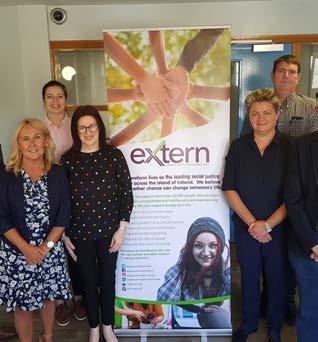
Make your voice heard with the
Extern’s Communications Team have been embracing the latest technology to capture the unique voice of colleagues across the organisation for a new series of podcasts.

The Extern Buzz podcast aims to give staff from across the organisation the chance to find out more about their colleagues and the work which goes on in areas they may not normally come across. No topic is out of bounds, with episodes already recorded covering such diverse areas as problem gambling, fundraising and homelessness. As well as giving staff members the chance to discuss their work, the podcast also aims to find out what motivates our colleagues and their reasons for working in this sector.
“Being able to give our colleagues a voice matters so much, especially in an organisation as widely spread as Extern,” says Extern Head of Communications Sharon Hearty. “The reasons why people do the jobs they do are varied, but for many it is the drive to make life better for the
people they support. That is maybe something which can go unheard among the daily demands and duties we all face, and that’s why this podcast is a great way to delve a bit deeper into what makes us all tick.
“We have had some great interviews so far, and I would encourage others to come forward to take part in this fantastic new project, which really harnesses the growing popularity of podcasting to create something unique and enjoyable.”
To find out more about the Extern Buzz podcast, including how you can participate, please contact the Communications Team at comms@extern.org